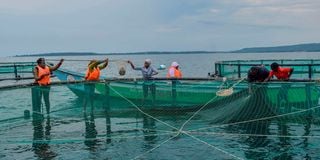Drive launched to end ‘sex for fish’ culture in Homa Bay

Angela Odero (left), the founder and CEO of Rio Fish, and her workers prepare to catch fish from a cage in Homa Bay.
What you need to know:
- Angela Odero says 'sex for fish' is largely fuelled by inadequate supply.
- When women have a limited source, desperation creeps in and they fall victim to joboya (sexual predators).
Angela Odero paints a picture and demeanour of simplicity. Her reserved nature barely defines her personality.
However, what goes easily unnoticed during a first encounter with her is her undying determination to stamp out the infamous ‘sex for fish’ culture, a common practice among the fisherfolk living around Lake Victoria.
Ms Odero, now in her late 40s, says her quest to end the malpractice saw her venture into aquaculture, a male dominated field. In 2014, she established a fish farm in Homa Bay and later expanded to Migori County where she started Rio Fish hub in 2020.
Her aim was to breed her own fish and purchase some more from smallholders. She would then add value to processed fish and sell it whole. Part of the fish stock would be scaled, sun-dried or smoked before being preserved and sold.
Ms Odero, who was born and raised in Nairobi, had no prior skills in handling or processing fish until she got married and moved to her husband’s home in Suba, Homa Bay County. She recalls how her mother, a lecturer, had one time requested her to help with a proposal writing on the role of ‘sex for fish’ in the spread of HIV/Aids around the lake region.
“It is in the proposal that I came across jaboya (a fisherman who supplies fish to traders) and how they prey on vulnerable women looking for fish,” Ms Odero says.
She would later come across the jaboya story again while at her in-laws’ in Homa Bay. The revelation that some women went to the extremes of offering their young daughters to joboya (plural for jaboya) in exchange for fish really pained her.
“Sex for fish is largely fuelled by inadequate fish supply. When the women have a limited source, desperation creeps in and that’s when they easily get lured into the practice.”

Rio Fish founder and CEO Angela Odero at her a fish farm in Homa Bay.
To break the habit, she says, the source of fish supply must be expanded and women must be equipped with the right tools and information on fish farming. In 2014, Ms Odero co-founded fish farms in Suba with her husband, with the aim of bridging the supply gap.
Even though the venture ran into some teething problems, it sailed through. “The women would buy the fish and deplete the stock by the third week and that was still a threat to my mission,” Ms Odero explains.
To fix this, she went big on storage, and, while at it, the fish hub acquired a county facility in Opapo, Migori County, which now operates as a fish plant. “We also had to change the mindset of the women and convince them that they can keep fish.”
One of the things she says discourages women from taking up fish farming is the fear of the huge workload associated with the activity. Other challenges include lack of funding and discrimination by those around them who openly question their ability to manage the farms.
To ensure a steady supply of fish to the hub, the CEO has embarked on a journey to create awareness and recruit more women to the field. She says for gender equality, Rio Fish hub has created 30 jobs, out of which 24 were reserved for women. The fish hub awards employees a fully paid maternity and paternity leave and provides annual leave.

Rio Fish founder and CEO Angela Odero in her office.
“I appreciate that we cannot be 100 per cent women employees, but I keep men to a minimum. Fish farming is labour-intensive but can still be done by women.
“Currently, we have three women’s groups that operate cages in Lake Victoria and do everything, including rowing the boats to feed the fish,” says Ms Odero.
The fish farm has partnered with Eco Network Africa and buys fish from three women’s groups, namely Litare, Mrongo and Kaugege.
Ms Odero, who chairs the Commercial Aquaculture Association of Kenya, says they are working to be recognised as an organisation supporting women and youth.
“Women practicing aquaculture must be prepared to face criticism from people around, especially men. To remain afloat in the turbulent waters, they must learn to grow a thick skin,” she says.





